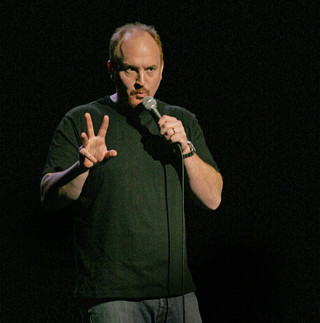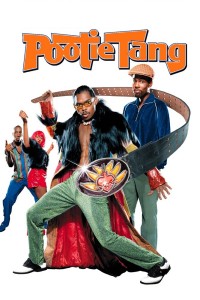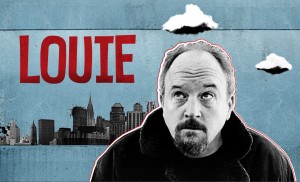It’s a cliche for white males under the age of thirty, but my favorite comedian is definitely Louis CK. Prolific, hilarious, and insightful in a dark sort of way, CK is always a delight. He’s also someone whose creative career I admire. There’s an independence and perseverance about him that carries over in everything he does.
 Let’s start with his standup. Comedians have to both have funny material and good delivery. Good delivery can trick you into thinking that material is funny than it actually is — known as the Dane Cook Conundrum — but great comedians have funny things to say and funny ways to say them.
Let’s start with his standup. Comedians have to both have funny material and good delivery. Good delivery can trick you into thinking that material is funny than it actually is — known as the Dane Cook Conundrum — but great comedians have funny things to say and funny ways to say them.
CK, of course, excels in both categories. First, his delivery is incredible. He’s just good at saying things and telling stories. It sounds simple but it’s true. He’s not quite as animated or manic as many popular comedians, but he lets the intensity and absurdity of his jokes escalate at perfect times, often with profanity. Nobody I’ve ever heard speak makes more effective use of obscenities than Louis CK.
Compare his hilarious, flowing story about his frustrating first child to Aziz Ansari, who — even in his best special yet — keeps his delivery a little bit too manic, with little flow or few strategic pauses. CK is just a master of funny storytelling.
.
But I also think that Louis CK’s material is what sets him apart. Along with the usual observational humor, he’s got his finger on the pulse of the way society is evolving in a more sophisticated way than most of his peers. He’s a little bit of a George Carlin (one of his cited influences) but about our social lives rather than our political lives. There’s a reason his most famous bit is an interview with Conan O’Brien known as “everything is amazing and nobody’s happy” — it’s one of his better, more scathing criticisms of modernity.
One of the charming things about CK is how he reflects on truths by reflecting on his own failures. I recently re-watched his Live at the Beacon Theater special, and he spends a good chunk of the time talking about how frustrated and mean a parent he is. But it’s not JUST “ha ha, kids are annoying” but because he sees the social construct of families disintegrating.
But as much as I love his standup, a lot of my appreciation of Louis CK comes from my admiration of his entrepreneurial spirit. He’s a creator and independent. Let’s look at a couple of his projects:
After a couple jobs writing for sketch shows and appearing on HBO’s Comedy Half Hour, CK wrote, produced, and directed his own movie in 1998, a black-and-white comedy called Tomorrow Night that featured pre-breakout Wanda Sykes, Steve Carell, and Conan O’Brien. It aired at festivals and failed to get a distributor.
 A couple years later, after writing for The Chris Rock Show, he received the opportunity to write and direct a movie spinoff of a popular sketch about a jive-speaking badass named Pootie Tang. Paramount hated it so much that they drastically edited and trimmed it to an 80-minute, panned flop. (Personally, I thought it was hysterical in an absurd sort of way. “Sa dah tay.”)
A couple years later, after writing for The Chris Rock Show, he received the opportunity to write and direct a movie spinoff of a popular sketch about a jive-speaking badass named Pootie Tang. Paramount hated it so much that they drastically edited and trimmed it to an 80-minute, panned flop. (Personally, I thought it was hysterical in an absurd sort of way. “Sa dah tay.”)
Despite these failures, CK continued pursuing projects that would give him creative control. In 2004 he produced a pilot that was never picked up. Two years later, he finally had a pilot picked up, a profane spin on family-oriented multi-cam sitcoms called Lucky Louie.
The success was short-lived as HBO quickly canceled the poorly-reviewed show. CK returned to acting, appearing in his friend Ricky Gervais’s movie, The Invention of Lying, and making an awesome turn as Leslie Knope’s cop boyfriend in Parks and Rec.
But CK’s popularity was gradually growing in part due to clips of his standup receiving millions of views on YouTube. In 2009, he made an agreement with FX to create a new show. In exchange for complete creative control, he received only a shoestring budget from the channel. As the writer, director, editor, and star of the new show called Louie, he created a lo-fi comedy about his life in New York.
 Louie has hit several different tones and styles, and often feels more like a semi-autobiographical short film project than a TV series. Despite (or perhaps because of) its uniqueness, it became a huge critical hit and a moderate ratings hit, especially in its second and third seasons.
Louie has hit several different tones and styles, and often feels more like a semi-autobiographical short film project than a TV series. Despite (or perhaps because of) its uniqueness, it became a huge critical hit and a moderate ratings hit, especially in its second and third seasons.
Capitalizing on the swell of his popularity, he self-produced a stand-up special that he released on his website as a $5 digital download, a new model for standup that became an enormous success and has been borrowed by several other comedians. Since then, CK has released two more specials and his 1998 movie Tomorrow Night in the same way.
There’s so much about his career arc that I love. His story isn’t one of luck, but of craft and hard work. He valued creative independence and fought for more than a decade to create a successful model on his own terms. He never let previous failures prevent him from getting up and trying again. He thrived off of teaching himself how he entire creative process of film and comedy, from writing to acting to directing to producing to editing to distribution.
He drops more F-bombs than I ever hope to, but Louis CK is someone whose career and work ethic I admire. Add that to his brilliant standup and you have the only comedian to make this Top 100.





